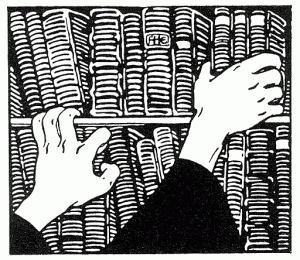Classic Treasures: The Iron Heel by Jack London
I mentioned before that I’d loaded my Sony E-reader up with a bunch of books from Project Gutenberg. Since 1971 volunteers have scanned and proofed uncounted volumes of fiction and non-fiction. That proofing part of the process is very important. The few books I’ve pulled from Google Books tend to have a bunch of OCR errors, like the word “clear” being made out of the word “dear.” The computer spell check does not flag clear as wrong.
The Iron Heel by Jack London is an interesting offering that’s classed as science fiction. It’s a story of a dystopian future in which the Oligarchy—known as The Iron Heel—takes over North America (including Canada and Mexico) and crushes the laboring classes. The story written first person from the point of view of Avis Everhard, wife of Ernest Everhard. They are both socialist heroes who are killed by the Iron Heel. The book is a manuscript of her memoirs which has been discovered by a future historian and annotated by him to explain fine details. The book was published in 1908.
It’s got two very interesting aspects to it. First, the whole artifice of having a future historian annotating the document is wonderful. It allows some wry observations and jabs to be taken at contemporary characters, since the historian knows how they will be “remembered” by the future. This is a technique I’d like to play with, I think. I’ve approached it obliquely in The Dark Glory War and used footnotes similarly in Wolf and Raven, but never quite with the calculated effect London achieves in this book.
Second, while the book is clearly science fiction in the broadest sense, it avoids the whole reliance on technology which usually classifies a work as science fiction. It is clearly predictive, and as it was published in 1908, London makes some fairly good guesses about where attacks will come against America. He predicts, for example, a strike at Pearl Harbor, albeit 40 years early. He also does a spectacular job of explaining socialist philosophy, and predicts a successful socialist revolution to save humanity.
But, then, he didn’t foresee the rise of modern mass media, nor the creation of the service society; both of which completely undermine the means by which his socialists would eventually have their victory. The descent into the Oligarchy, however, is frighteningly familiar; and close enough that I may have to start buying bullets in bulk.
The best thing about this book, and one that makes me happy to classify it as science fiction, is that it does make one think. I’m sure there are scholars who will be critical of the lectures that get delivered in the text; but given that the book is a memoir by the woman who loved Ernest Everhard, it’s entirely likely and believable that she would record his great rhetorical triumphs so faithfully. While I was aware I was being lectured, I also had to think about the things I was reading. This ability to turn another person’s brain on is the greatest gift a writer can possess; and watching a century-old novel promoting socialism, and having to figure out how that message applies to today, was great fun.
The link above will take you to the Project Gutenberg edition of the book. I read it in e-pub and it’s quite clean. Interesting read, and a fascinating way to start the New Year!



 02. Jan, 2010
02. Jan, 2010 








Comments are closed.